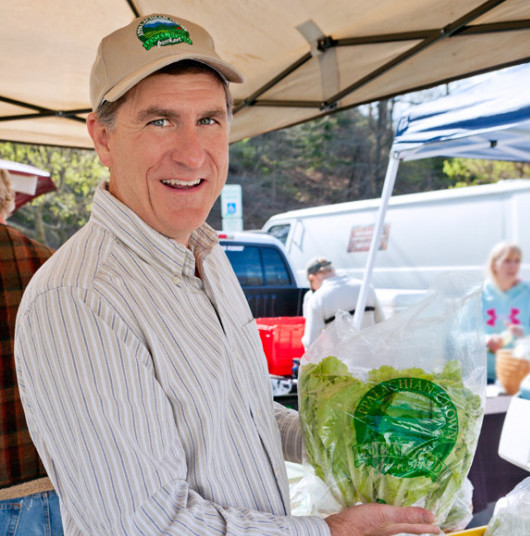To fully appreciate how rich our local food scene is, it helps to leave town, says Appalachian Sustainable Agriculture Project founder and executive director Charlie Jackson. “It’s hard to get perspective sometimes,” Jackson says. “But you can really tell [how great Asheville’s food scene is] when you have to leave to go someplace else. In a fairly short time, we’ve seen tremendous change. We were absolutely not Foodtopia 15 years ago.”
Jackson, who was a struggling farmer in Madison County in the 1990s, remembers a time when people didn’t generally consider downtown Asheville as a dining destination. “There were at least a couple of good restaurants,” he recalls, “but there wasn’t much. In a really short time frame, our food scene has just been transformed.”
And ASAP, which launched in 2000 as a local food campaign to help reverse the loss of farms in Western North Carolina during the decline of the tobacco market, has been integral to that transformation. Through its widespread of programs and initiatives, including the Local Food Guide (which has now distributed more than a million copies), annual Business of Farming conference, Appalachian Grown certification, Farm Tour, Growing Minds school initiatives and tailgate market support efforts, ASAP’s focus on connecting farmers to their communities through food has literally helped grow Asheville’s food culture by nourishing its agrarian roots.
An analysis ASAP did of the 2012 Census of Agriculture, released in May, shows that in recent years, WNC has completely reversed farming’s steep decline. Between 2007 and 2012, direct sales of fruit and vegetables in Western North Carolina increased by nearly 70 percent, while the rest of North Carolina experienced a loss of 2 percent and the rest of the U.S. grew a modest 8 percent. “That’s how different it is here,” says Jackson.
Jackson is humble about ASAP’s role in Asheville’s emergence as a culinary mecca. “I’m being careful not to take too much credit for this because there are so many people involved,” he says. “But I do believe that the local food [movement] and the fact that our farmers have stepped up and created all these wonderful products has been that primary ingredient we need to create this wonderful food scene. If we didn’t have that, we would be like anywhere else in the country.”
Moving forward, Jackson says, it’s crucial that ASAP maintain the integrity of the local-food concept. “That’s what people want,” he says. “They want that authentic connection to their communities, but there are some who see it as more of a marketing opportunity than an opportunity to change they way they operate. So our role is to keep the veracity and authenticity, or we’re going to lose it. I think that’s just generally true of our food scene in Western North Carolina — it has to be real, or people are going to see through it.”




Is their a way to get in contact with Charlie Jackson ?